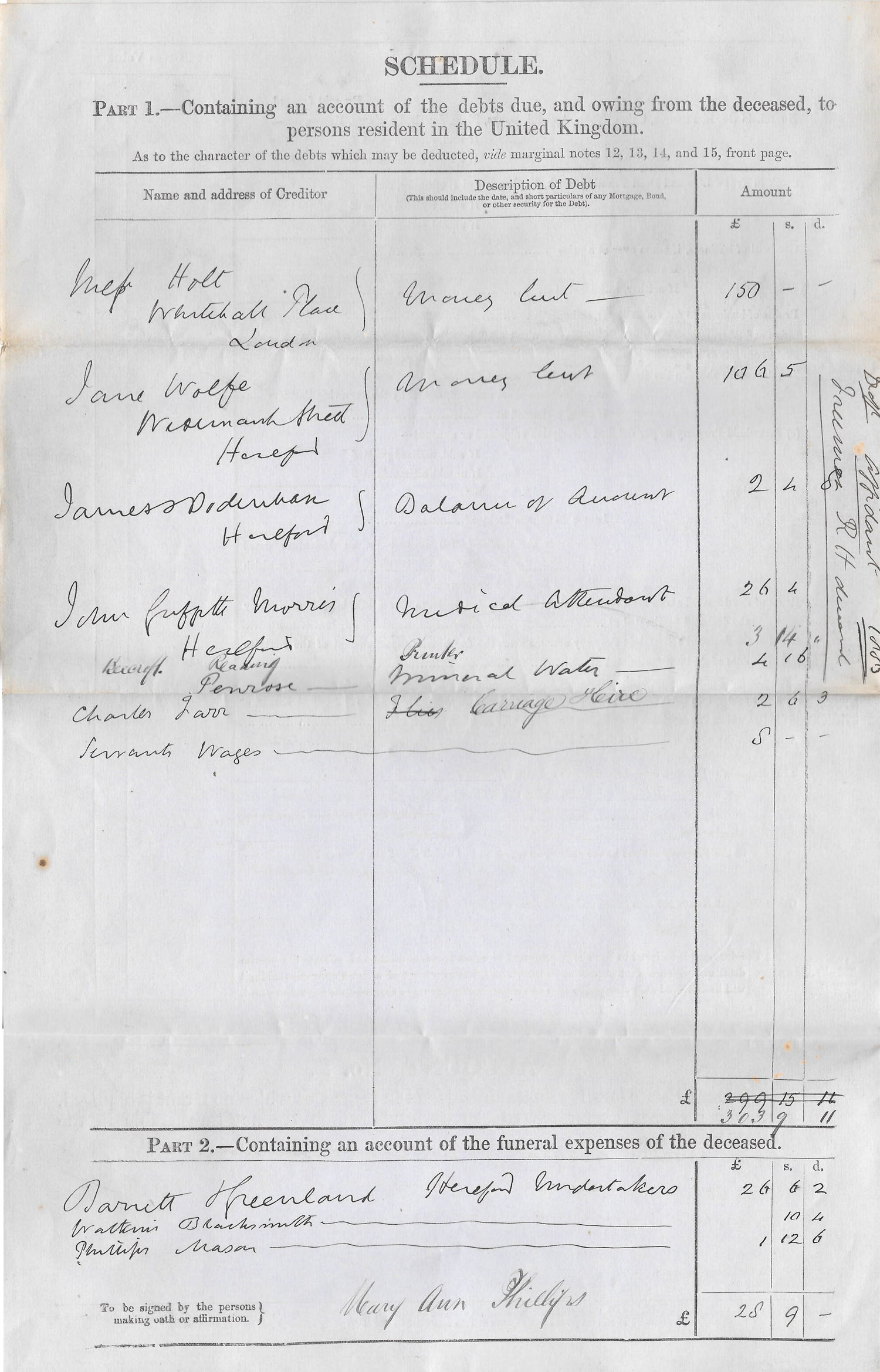
Captain Richard Henry Freeman (1836–1883): A Soldier’s Legacy and Family Duty
In 2012, a remarkable collection of legal and personal records came to light relating to Captain Richard Henry Freeman, born on the 6th of October 1836 at Lugwardine, a village just east of Hereford, England. The archive, which includes his probate papers, lawyer’s correspondence, and other retained documents, offers insight not only into the closing chapter of his life but also into the wider familial and historical context in which he lived and served.
Captain Richard Henry Freeman, a distinguished officer of the 16th Lancers, left behind a fascinating legacy tied to his military service and the Crimean War. Upon his passing, probate documents shed light on his estate and its significant value. His connection to Major Edward Phillips and the subsequent inheritance process offer a unique glimpse into the lives of British soldiers during the Victorian era. This article explores Freeman’s legacy and the probate records that illuminate his remarkable life.
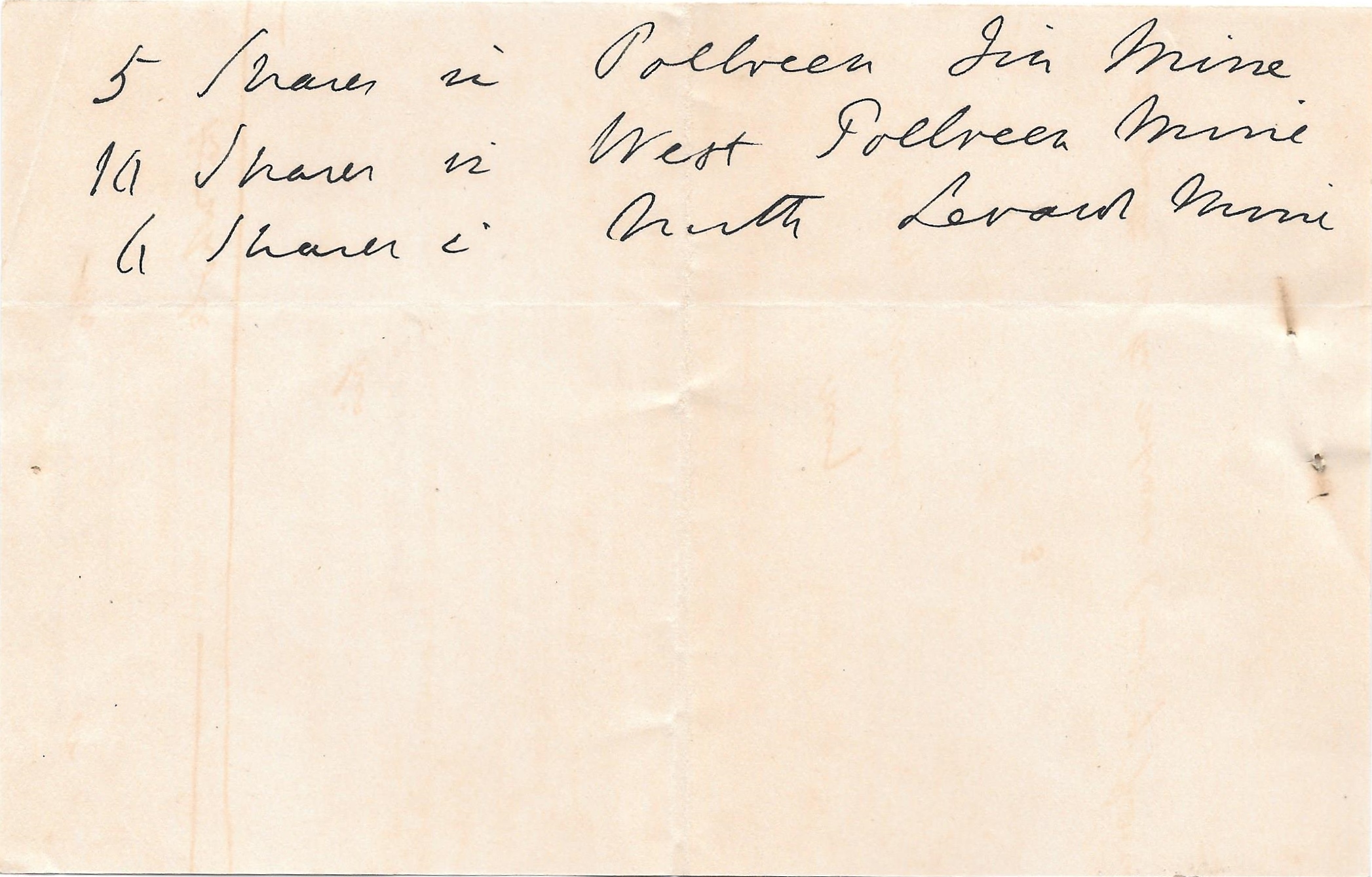
Captain Freeman belonged to a prominent Herefordshire family, long connected to the estate known as The Rock, located at Lugwardine. This house was both his place of birth and the location of many key family events. Freeman remained unmarried throughout his life and maintained close ties with his siblings, most notably his sister Mary Ann Phillips (née Freeman), who would play a crucial role following his death.
Military Service and the 16th Regiment
Captain Richard Henry Freeman pursued a career in the military at a time when Britain was deeply entrenched in imperial duties and frequent overseas conflicts. He was commissioned into the 16th (The Queen’s) Lancers, a cavalry regiment of the British Army known for its distinguished service across the Empire. Over the course of more than a decade, he demonstrated steady progress through the ranks, ultimately being promoted to Captain on the 16th of October 1865. This promotion would have placed him in a position of considerable responsibility during a period when cavalry tactics were being adapted to modern warfare and the shifting priorities of Britain’s imperial engagements.
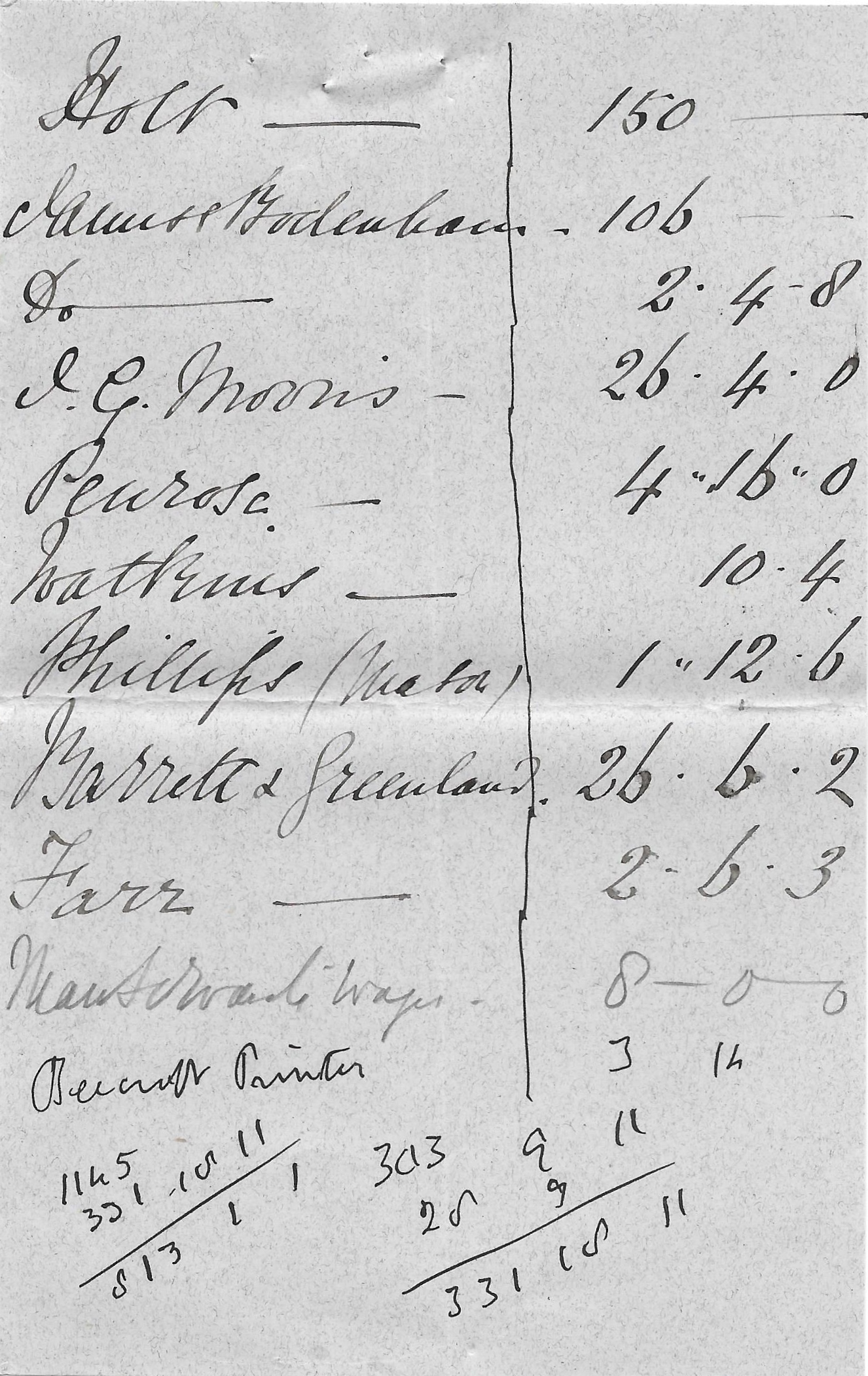 Although he did not serve in the Crimean War like his brother-in-law, Captain Freeman’s career spanned the turbulent decades of the mid-Victorian era. The 16th Lancers saw service in India, and it is very likely that Freeman spent part of his military life on the subcontinent during or shortly after the Indian Rebellion of 1857—a campaign that fundamentally altered the structure of British colonial rule. However, unlike many of his contemporaries, Captain Freeman did not leave behind memoirs or publicly recorded dispatches. His career, while quietly dutiful, remained largely in the shadows of larger imperial events. His military record shows no known scandal nor public recognition—only the quiet honour of long service and rank.
Although he did not serve in the Crimean War like his brother-in-law, Captain Freeman’s career spanned the turbulent decades of the mid-Victorian era. The 16th Lancers saw service in India, and it is very likely that Freeman spent part of his military life on the subcontinent during or shortly after the Indian Rebellion of 1857—a campaign that fundamentally altered the structure of British colonial rule. However, unlike many of his contemporaries, Captain Freeman did not leave behind memoirs or publicly recorded dispatches. His career, while quietly dutiful, remained largely in the shadows of larger imperial events. His military record shows no known scandal nor public recognition—only the quiet honour of long service and rank.
Death and Intestacy
Captain Freeman died intestate—without having made a will—on the 20th of June 1883, aged 47, at The Rock, his lifelong family home. His death came suddenly and perhaps unexpectedly for a man still relatively young by Victorian standards. In the absence of a spouse or direct heir, responsibility for his estate passed to his sister Mary Ann Phillips, who at the time was residing in Reading with her husband, Major Edward Phillips, a distinguished officer in his own right.
Probate was granted at the District Registry in Hereford later that year. The accompanying documentation reveals the scope of Captain Freeman’s assets, which included investments in overseas government bonds, shares in British companies, and some household effects. His estate was valued at £1,145, a considerable sum at the time, equivalent to over £150,000 today in relative economic terms. Legal correspondence preserved in the archive indicates that a number of creditors and service providers, from physicians to undertakers and tradesmen, were settled through the estate in the months following his death.
Mary Ann Phillips and Family Responsibility
The probate archive demonstrates the crucial role of Mary Ann Phillips (née Freeman), who was just 44 at the time of her brother’s passing. Despite the male-dominated legal and military systems of the Victorian era, she assumed full responsibility for administering his estate, taking on legal, financial, and familial duties with clear diligence. Living at the time in Reading, she was well-positioned both socially and intellectually to manage such affairs.
Mary Ann’s marriage to Major Edward Phillips had brought her into a family equally steeped in military tradition. Her husband had entered the 8th Hussars in 1851 and had risen to considerable fame due to his participation in one of the most storied military episodes in British history: the Charge of the Light Brigade at Balaclava during the Crimean War.
Major Edward Phillips: A Hero of the Light Brigade
Major Edward Phillips, who would live until 1915, was in many ways the historical counterpoint to the quieter, less heralded military life of Captain Freeman. He rode in the infamous charge on the 25th of October 1854, when a miscommunicated order led the British Light Brigade to gallop headlong into a heavily fortified Russian artillery position—an event memorialised in poetry, prose, and military lore.
The historian Alexander William Kinglake describes an astonishing episode during the charge in which Lieutenant Phillips (as he then was) lost his horse and found himself stranded alongside Private Brown, a soldier grievously wounded in both hands. Attacked by Russian lancers, Phillips used his revolver to hold them off. With the situation desperate, the order to recall was sounded. The enemy withdrew, and Phillips, with Private Brown in tow, was able to return to British lines—both men miraculously surviving the ordeal.
Phillips went on to serve in India during the Mutiny of 1857, where he was mentioned in dispatches for his role in pursuing rebel forces. After retiring from the Regular Army in 1860, he continued to serve as adjutant to the Ayrshire Yeomanry, further contributing to the nation’s military organisation. In civilian life, he became known for his sporting enthusiasm—particularly golf—and was secretary of the Prestwick Golf Club, while also immersing himself in religious and charitable work in Reading. He and Mary Ann had nine children, including a son who rose to the post of His Majesty’s Consul in Shanghai.
Major Phillips died at Hillcroft, Marlborough Avenue, Reading, in 1915, aged 84. At the time of his death, he was one of only two surviving officers of the Light Brigade, the other being Captain Percy Smith of Southampton. His funeral took place on what would have been his 85th birthday, with burial at St. Peter’s Church, Earley.
The Freeman–Phillips Legacy
The deaths of Captain Freeman in 1883 and Major Phillips in 1915 mark the passing of two military careers emblematic of 19th-century British service—one quiet and dutiful, the other public and decorated. The intersection of their lives through Mary Ann Freeman reflects not only the responsibilities borne by women in estate and family management, but also the network of connections that tied provincial England to the farthest reaches of the British Empire.
The Rock at Lugwardine, the battlefields of Crimea and India, and the suburban chapels of Reading together tell a story of Victorian honour, loss, and duty—carried out on horseback, in silence, and through the ledgers of probate.
DEATH of MAJOR PHILLIPS. AT EARLEY. Major Edward Phillips, late of the 8th Hussars, of Hillcroft,”Marlborough Avenue, Reading, died at his residence on Sunday in his 85th year. He was one the two surviving officers who took part in the famous charge of the Light Brigade at Balaclava, the other being Captain Percy Smith, of Southampton. He obtained a commission in the 8th Hussars in 1851, and served through the Crimean War. Kinglake, his history the war, referring to the famous charge, says: —Lieutenant Phillips, who had just had his horse shot under him, and Private Brown, who had been disabled in both hands, were attacked by lancers, and although Phillips was able to keep off the assailants with his revolver, both he and the soldier whom was protecting must have been the point of being either dispatched or taken when, the recall being sounded, the lancers rode off, and Phillips and the soldier be had guarded made good their way back to our lines.” In 1857 he went with his regiment India, and took part in the operations in pursuing the rebels in the Mutiny, being mentioned in dispatches. After retiring from the Regular Army m 1860 Major Phillips acted as adjutant to the Ayrshire Yeomanry for a number years. has four sons living, one of whom is his Majesty’s Consul at Shanghai, and five daughters. In his early years he was very keen sportsman, and was secretary of the Prestwick Golf Club. He was largely interested in the religious work of the town, and of late years was a member of the congregation of St. Mary’s Episcopal Chapel, Castle Street, Reading. The interment took place on the afternoon of Thursday (which would have been the 85th birthday of deceased), at St. Peter’s, Earley, the grave being on the south-east of the church”.
Printed by Authority.
This form should be used in all cases except when the whole personal estate wherever situate and without deducting debts or funeral expenses is of the value of £100 or under. No Stamp Duty or Legacy Duty is payable on it. Stamp Duty of 30s. is to be impressed under the provisions of Sec. 33 of the Act 44 Victoria cap. 12.
A Stamp duty of 30s. can be impressed only in the case of a person dying on or after the 1st June 1881 whose whole personal estate wherever situate and without deducting debts or funeral expenses exceeds the value of £100, but does not exceed the value of £300.
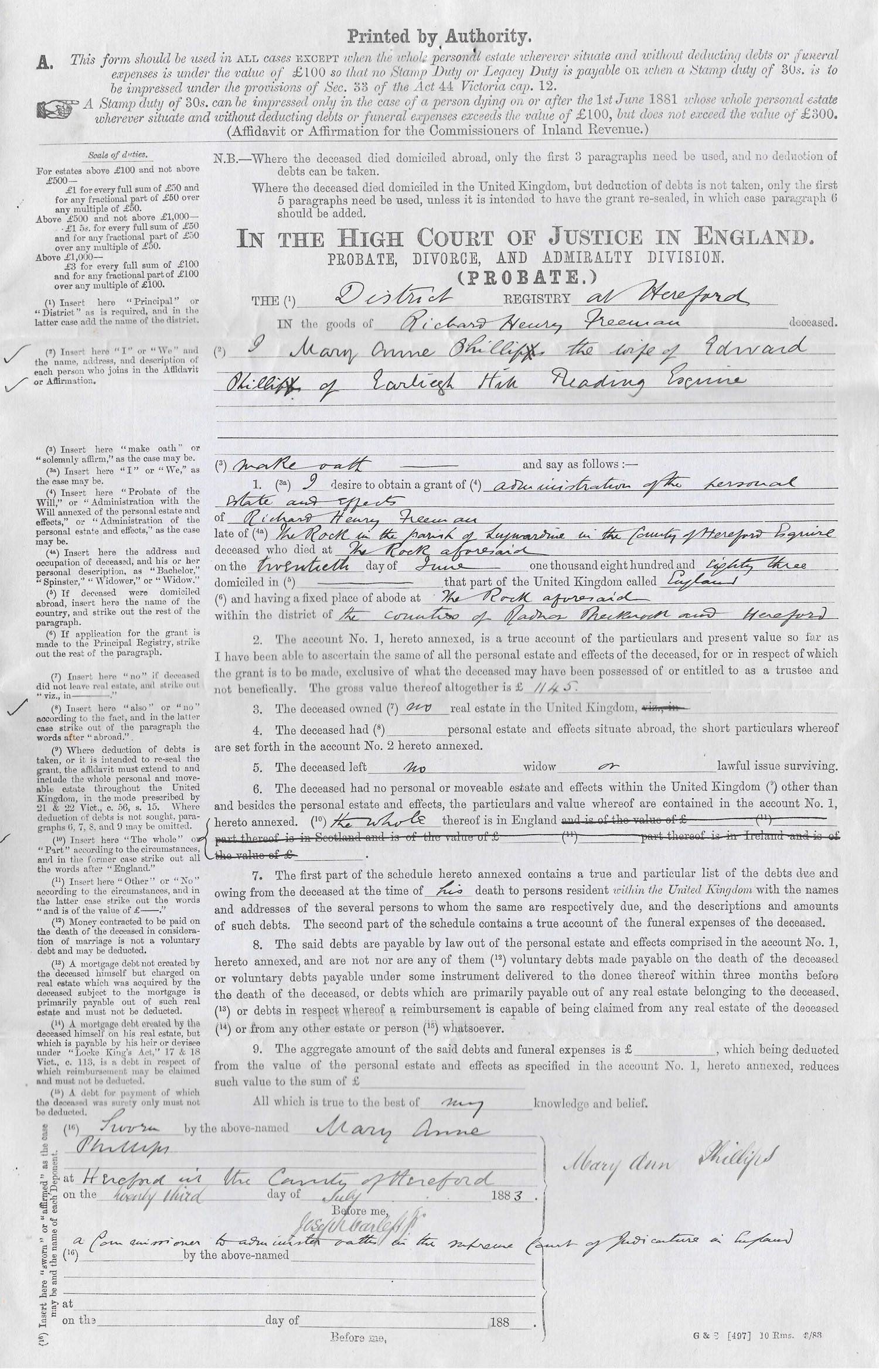 IN THE HIGH COURT OF JUSTICE IN ENGLAND
IN THE HIGH COURT OF JUSTICE IN ENGLAND
PROBATE, DIVORCE, AND ADMIRALTY DIVISION
(PROBATE.)
The District Registry at Hereford
In the goods of Richard Henry Freeman, deceased.
I Mary Anne Phillips, the wife of Edward Phillips of Eardisley Hill Reading Room, Eardisley, Hereford
make oath and say as follows:
-
That I desire to obtain a grant of Administration of the personal estate and effects of Richard Henry Freeman, late of The Rookery near Lugwardine in the County of Hereford Esquire, deceased, who died at The Rookery aforesaid, on the 24th day of October one thousand eight hundred and eighty-three, domiciled in England, and having a fixed place of abode at The Rookery aforesaid, within the district of the Counties of Worcester, Gloucester, and Hereford.
-
That the account No. 1, hereto annexed, is a true account of the particulars and present value so far as I have been able to ascertain the same of all the personal estate and effects of the deceased, for or in respect of which the grant is to be made, exclusive of what the deceased may have been possessed of or entitled to as a trustee and not beneficially. The gross value thereof altogether is £1145.
-
The deceased owned no real estate in the United Kingdom.
-
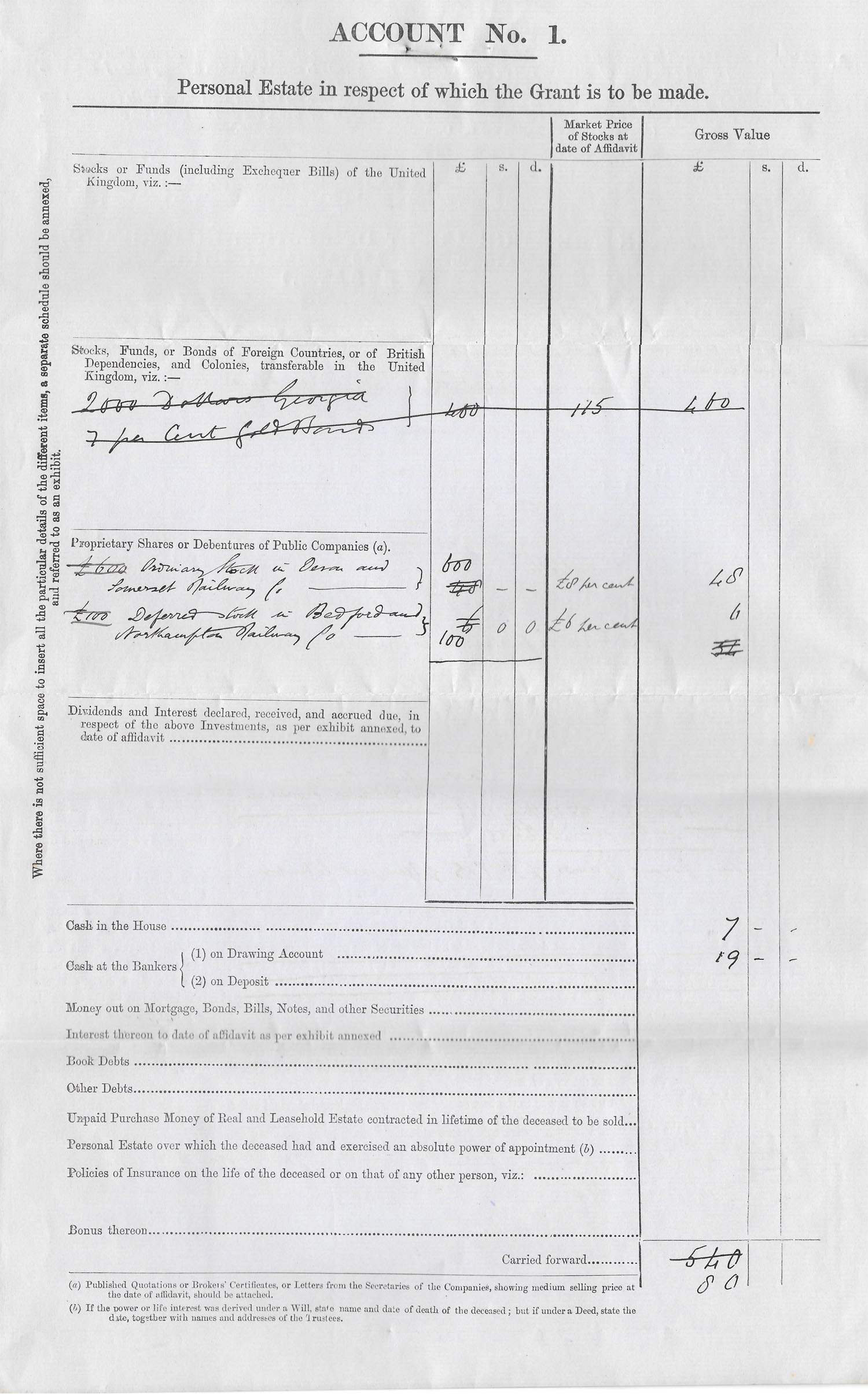
The deceased had no personal estate and effects situate abroad, the short particulars whereof are set forth in account No. 2 hereto annexed.
-
The deceased had no widow or lawful issue surviving.
-
The deceased had no personal or moveable estate and effects within the United Kingdom other than and besides the personal estate and effects, the particulars and value whereof are contained in the account No. 1 hereto annexed. The whole thereof is in England.
-
The first part of the schedule hereto annexed contains a true and particular list of the debts due and owing from the deceased at the time of his death to persons resident within the United Kingdom, with the names and addresses of the several persons to whom the same are respectively due, and the descriptions and amounts of such debts. The second part of the schedule contains a true account of the funeral expenses of the deceased.
-
The said debts are payable by law out of the personal estate and effects comprised in the account No. 1 hereto annexed, and are not nor are any of them voluntary debts made payable on the death of the deceased or voluntary debts payable under some instrument delivered to the donee thereof within three months before the death of the deceased, or debts which are primarily payable out of any real estate belonging to the deceased, or debts in respect whereof a reimbursement is capable of being claimed from any real estate of the deceased or from any other estate or person whatsoever.
-
The aggregate amount of the said debts and funeral expenses is £ [not stated], which being deducted from the value of the personal estate and effects as specified in the account No. 1 hereto annexed, reduces the value thereof to [blank].
And I make this solemn declaration conscientiously believing the same to be true and by virtue of the Statutory Declarations Act 1835.
Sworn at Hereford in the County of Hereford
this 14th day of November 1883
Before me, [signature unclear – possibly “Jas. W. Lilly”],
A Commissioner to administer oaths in the Supreme Court of Judicature in England.
(Signed) Mary Anne Phillips
ACCOUNT No. 1
Personal Estate in respect of which the Grant is to be made.
| Category | Market Price of Stocks at Date of Affidavit | Gross Value |
|---|---|---|
| Stocks, Funds, or Bonds of Foreign Countries, or of British Dependencies, and Colonies | ||
| 2000 Dollars – Egypt 7 per Cent Gold Bonds | £460 | £460 0s 0d |
| Company/Asset | Value | Gross Value |
|---|---|---|
| 600 Ordinary Stock in Devon and Somerset Milling Co. | £600 | £48 6s 0d |
| 100 Deferred Stock in Bedford and Northampton Railway Co. | £100 | [unlisted or 0] |
Dividends and Interest
Received, declared, or accrued due:
(Left blank – presumed not applicable or not yet declared.)
Cash
| Location | Amount |
|---|---|
| Cash in the House | £7 0s 0d |
| Cash at the Bankers | £19 0s 0d |
-
Money out on Mortgage, Bonds, Bills, Notes, and other Securities
-
Book Debts
-
Other Debts
-
Unpaid Purchase Money of Real and Leasehold Estate
-
Personal Estate under power of appointment
-
Policies of Insurance (and bonus)
Carried Forward Total:
£540 8s 0d
Continuation of ACCOUNT No. 1
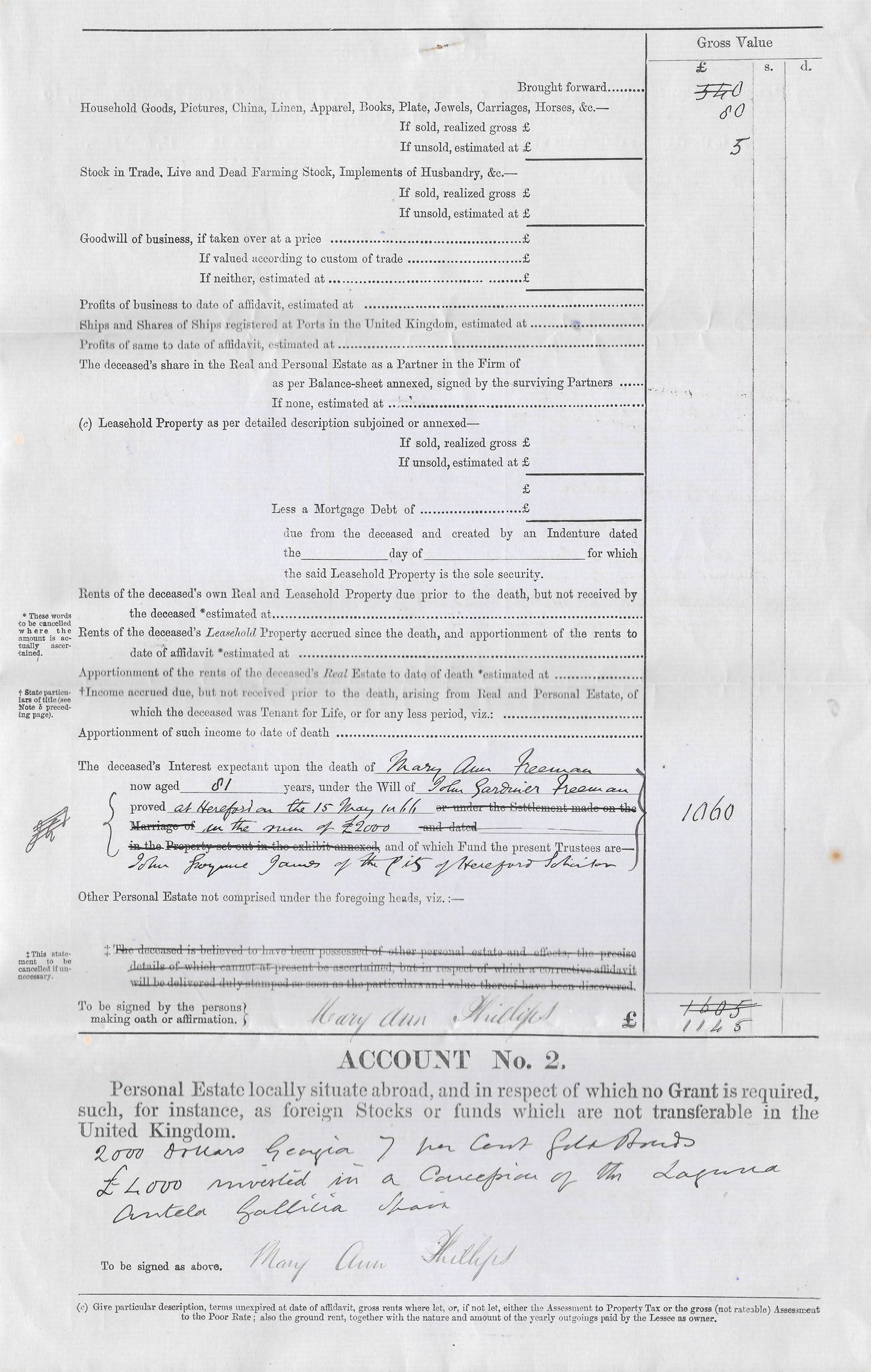 Gross Value Brought Forward:
Gross Value Brought Forward:
£540 8s 0d
Additional Personal Estate:
| Item | Gross Value |
|---|---|
| Household Goods, Pictures, China, Linen, Apparel, Books, Plate, Jewels, etc. | £5 0s 0d |
| [All other categories — e.g., stock in trade, goodwill, ships, leasehold, profits, book debts, etc.] | [blank] |
| Deceased’s interest expectant upon the death of Mary Ann Freeman under the will of Louisa Garnier Freeman proved at Hereford the 15 May 1866, with a value of | £1060 0s 0d |
TOTAL Gross Personal Estate: £ 1605 8s 0d
(Sum of £540 8s 0d + £5 0s 0d + £1060 0s 0d)
Signed by:
Mary Ann Phillips
ACCOUNT No. 2
(Personal Estate locally situate abroad, and in respect of which no Grant is required)
Foreign investments not transferable in the United Kingdom:
-
2000 Dollars Georgia 7 per Cent Gold Bonds
-
£1000 invested in a Conception of the Laguna Antelea Galicia, Spain
Signed by:
Mary Ann Phillips
SCHEDULE
PART 1 – Debts Due and Owing from the Deceased to Persons Resident in the United Kingdom
| Name and Address of Creditor | Description of Debt | Amount (£ s d) |
|---|---|---|
| Messrs Holt, Whitehall Place, London | Moneys lent | £150 1s 0d |
| Jane Wolfe, Widemarsh Street, Hereford | Moneys lent | £106 5s 0d |
| James Dodman, Hereford | Balance of Account | £2 1s 4d |
| John Gabbett Morris, Hereford | Medical Attendance | £26 4s 0d |
| — | Rents, Mineral Water, Letters, Carriage, Wine | £3 14s 6d |
| Charles Farr | [unspecified – likely service related] | £2 6s 3d |
| — | Servants’ Wages | £8 1s 0d |
Subtotal (Debts): £298 15s 11d
(corrected in margin to:) £306 9s 11d
PART 2 – Funeral Expenses
| Name | Service | Amount (£ s d) |
|---|---|---|
| Barrett & Greenland | Hereford Undertakers | £26 6s 2d |
| Watkins | Blacksmith | £0 10s 4d |
| Phillips | Mason | £1 12s 6d |
Total Funeral Expenses: £28 9s 0d
Signed by:
Mary Ann Phillips

